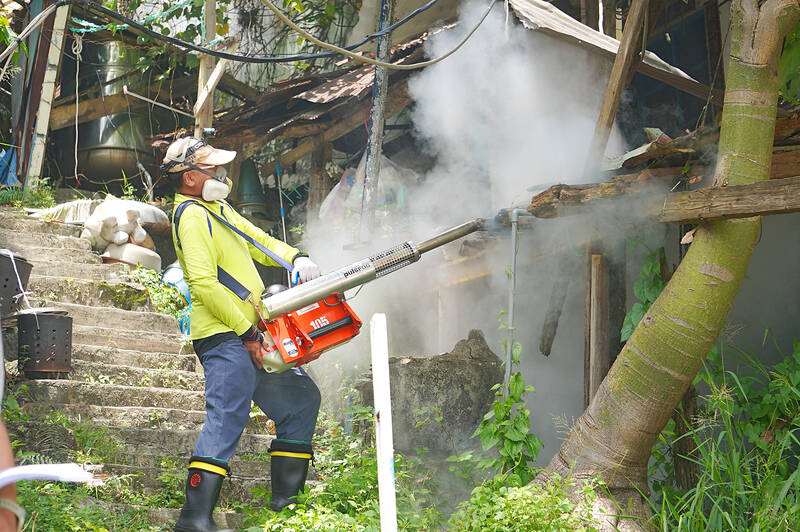The first local dengue cases of the year were confirmed on Monday, with a cluster of four infections in Kaohsiung, the Centers for Disease Control (CDC) said yesterday.
CDC Epidemic Intelligence Center Director Guo Hung-wei (郭宏偉) said the cases, all in Gushan District (鼓山), were infected with dengue virus serotype 2 (DENV-2).
CDC physician Lin Yung-ching (林詠青) said the first person was a man in his 50s who developed a fever, chills, headache and loss of appetite on Saturday and tested positive for dengue the following day after seeking medical treatment.

Photo: CNA
Contact tracing identified two family members — a woman in her 50s and a man in his 20s — who also tested positive for DENV-2, as well as a neighbor who had direct contact with them, Lin said.
All four people are hospitalized in general wards with mosquito-control measures in place, and their conditions are stable, he added.
CDC Deputy Director-General and spokeswoman Tseng Shu-hui (曾淑惠) said that this year’s first local dengue cases appeared relatively late — the latest in a decade. In previous years, the first local case was often reported in June or July, or even as early as late May, with outbreaks typically lasting into October.
Although this year’s first local dengue cases appeared later than usual, it does not necessarily mean the outbreak would be milder or more severe, Tseng said
Dengue outbreaks are strongly influenced by high humidity and warm temperatures — conditions recently seen across Taiwan that are ideal for mosquito breeding — raising the risk of further local infections, she said.
The Kaohsiung City Government has set up a district command center to inspect mosquito breeding grounds near the residences and workplaces of the four confirmed patients, and to carry out mosquito control measures, she added.
For prevention, the CDC urged the public to follow the “patrol, empty, wash and brush” principle: regularly check containers indoors and outdoors, discard stagnant water from unnecessary containers, clean and reuse only what is needed, and scrub the insides thoroughly to remove mosquito eggs.
Separately, Guo said nine new cases of melioidosis, including one death, were reported last week, bringing the total to 50 this year. Four of the new patients had direct contact with floodwater or mud, and eight remain hospitalized, he said.
Six new cases of leptospirosis were also reported last week, four of which involved direct contact with floodwater or mud, Guo said, adding that one patient remains hospitalized.
As melioidosis and leptospirosis are both bacterial infections primarily transmitted through contaminated floodwater, the CDC advised people engaged in rodent control or post-flood cleanup to wear face masks, waterproof gloves and long boots, wash thoroughly with soap afterward, disinfect flood-affected objects and drink only water that has been fully boiled.
Anyone who develops a fever or related symptoms should inform their doctor about any recent contact with floodwater or animals, the agency said.

A preclearance service to facilitate entry for people traveling to select airports in Japan would be available from Thursday next week to Feb. 25 at Taiwan Taoyuan International Airport, Taoyuan International Airport Corp (TIAC) said on Tuesday. The service was first made available to Taiwanese travelers throughout the winter vacation of 2024 and during the Lunar New Year holiday. In addition to flights to the Japanese cities of Hakodate, Asahikawa, Akita, Sendai, Niigata, Okayama, Takamatsu, Kumamoto and Kagoshima, the service would be available to travelers to Kobe and Oita. The service can be accessed by passengers of 15 flight routes operated by

MORE FALL: An investigation into one of Xi’s key cronies, part of a broader ‘anti-corruption’ drive, indicates that he might have a deep distrust in the military, an expert said China’s latest military purge underscores systemic risks in its shift from collective leadership to sole rule under Chinese President Xi Jinping (習近平), and could disrupt its chain of command and military capabilities, a national security official said yesterday. If decisionmaking within the Chinese Communist Party has become “irrational” under one-man rule, the Taiwan Strait and the regional situation must be approached with extreme caution, given unforeseen risks, they added. The anonymous official made the remarks as China’s Central Military Commission Vice Chairman Zhang Youxia (張又俠) and Joint Staff Department Chief of Staff Liu Zhenli (劉振立) were reportedly being investigated for suspected “serious

ENHANCING EFFICIENCY: The apron can accommodate 16 airplanes overnight at Taoyuan airport while work on the third runway continues, the transport minister said A new temporary overnight parking apron at Taiwan Taoyuan International Airport is to start operating on Friday next week to boost operational efficiency while the third runway is being constructed, the Ministry of Transportation and Communications said yesterday. The apron — one of the crucial projects in the construction of the third runway — can accommodate 16 aircraft overnight at the nation’s largest international airport, Minister of Transportation and Communications Chen Shih-kai (陳世凱) told reporters while inspecting the new facility yesterday morning. Aside from providing the airport operator with greater flexibility in aircraft parking during the third runway construction,

American climber Alex Honnold is to attempt a free climb of Taipei 101 today at 9am, with traffic closures around the skyscraper. To accommodate the climb attempt and filming, the Taipei Department of Transportation said traffic controls would be enforced around the Taipei 101 area. If weather conditions delay the climb, the restrictions would be pushed back to tomorrow. Traffic controls would be in place today from 7am to 11am around the Taipei 101 area, the department said. Songzhi Road would be fully closed in both directions between Songlian Road and Xinyi Road Sec 5, it said, adding that bidirectional traffic controls would